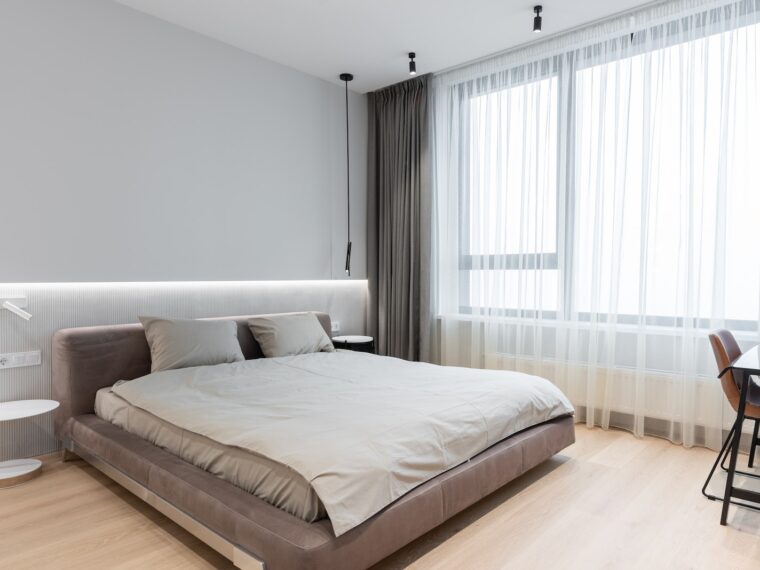Soft mattresses provide greater pressure relief and work particularly well for petite and average-sized sleepers, helping reduce night sweats while relieving joint pain or arthritis pain.
Soft mattresses don’t provide sufficient support for heavier body weights and tend to wear out faster than firmer options, leading to poor sleep posture and spinal misalignment.
Sleeping on a hard mattress
Your ideal mattress choice depends on your sleeping position and body type. For back and stomach sleepers, firm mattresses are usually preferable as they will support their spine more adequately; for side sleepers who need hip alignment support more, softer mattresses might provide greater comfort.
Soft mattresses provide relief from pressure points on the body that could otherwise lead to pain and discomfort, although some individuals may find them too soft and wake up with neck stiffness and shoulder ache. If this happens to you, try changing up your sleeping position; otherwise use a mattress topper to soften up the mattress further.
Softer mattresses may also help those suffering from back problems to achieve greater comfort. By maintaining straight posture and relieving stress on bones and organs, softer mattresses enable your lungs to receive more oxygen while you rest.
Sleeping on a hard mattress may be challenging for those with light body weights, as its firm surface may feel too hard and cause back or joint pain. A mattress topper or pillows may provide relief in these instances.
Hard mattresses tend to trap more heat than soft ones, causing for an uncomfortable night’s rest and shortening their lifespan considerably. Furthermore, this mattress type may not be ideal for those suffering from long-term back issues as its lifespan is often limited.
Test out mattresses in-store before making your decision; most mattress brands provide free trial periods so you can decide what is right for you. Take into consideration who else may share the bed, since this could change how it feels; also note that different firms define “firmness” differently, making comparisons essential before purchasing.
Sleeping on a soft mattress
Although sleeping on a soft mattress may feel inviting and supportive, it may not be ideal for everyone. Sleeping hot or having certain medical conditions may experience increased back and joint discomfort that causes backache or joint ache on soft mattresses; old or dirty ones could even trigger bed sores! Firm mattresses tend to provide greater support by evenly dispersing weight across their entirety preventing bed sores more effectively than soft ones.
Sleeping on a soft mattress can result in gradual sagging over time due to all of its layers and padding, creating an uncomfortable sleeping experience due to restricted movement space and overheating due to pillow-like comfort layers that trap your body heat. To mitigate these problems, opt for softer mattresses with cooling gel microbeads or breathable fabrics – either of these measures is recommended.
Soft mattresses may also exacerbate back pain if you are overweight or suffer from specific spinal conditions. A soft mattress doesn’t provide enough support to the spine and can encourage you to sleep in positions which put pressure on it; for instance, heavy sleepers could find that their hips sink too deeply into it and cause too much curvature of their spine, leading to joint twisting and pain.
As a rule, soft mattresses are best for side sleepers, those with back or stomach pain, couples sharing a bed, petite individuals who require adequate contouring, back/tummy sleepers who prefer firmer mattresses, back and stomach sleepers that maintain neutral spine positions as well as couples sharing beds. Your individual sleeping position and body type may determine what firmness levels feel best to you; back/tummy sleepers typically favor firmer mattresses while back sleepers and stomach sleepers tend to favor firmer ones that help maintain neutral spine positions while petite individuals require soft mattresses that respond quickly to body weight for adequate contouring whereas firmer options may help maintain neutral spine positions better whereas back/tummy sleepers benefit more from firmer mattresses which help maintain neutral spine alignment whereas back and stomach sleepers usually prefer firmer mattresses whereas back/tummy sleepers typically prefer firmer mattress so as not to disturb neutral spine alignment while sleeping on an inappropriate mattress could result in poor quality restful restful restful restful restful restful restful restful restful rest, leaving their joints or muscles sore and soreness the next morning! Sleeping on the wrong mattress could cause poor quality restful restful restful restful restful deprived restful waking resulting from poor quality rest resulting from sleep interruption during waking. Sleep on a wrong mattress can result in poor quality restful resulting from arthritis pain caused by sleeping on poor quality of course leading to poor quality of restful rest achy joints and muscle soreness the next morning due to poor quality or painful joint and muscle soreness in pain caused from arthritis symptoms worse than before waking. Sleep result.
Sleeping on a firm mattress
Firm mattresses are recommended for back sleepers as they provide support that keeps their spine in an ideal position, decreasing risk of pain or stiffness in the morning and decreasing chances of sag over time. Furthermore, firm mattresses tend to sag less over time which could cause misalignments that lead to neck or back discomfort. However, mattress firmness doesn’t necessarily correlate to comfort levels. Instead, this depends on various factors like body weight and preferred sleeping position of its user. A firm mattress may initially feel hard; but over time it should soften. A memory foam mattress, for instance, responds to body heat and pressure by altering density accordingly; innerspring mattresses do not respond as quickly and tend to remain firm over their lifetimes.
Those who sleep on their back may benefit from sleeping on a firm mattress because it provides support for hips, shoulders, and spine while aligning it properly. Firm beds also help improve posture which is key in creating healthy sleeping habits and firm beds can provide relief from arthritis or fibromyalgia related aches and pains by relieving pressure from joints and muscles.
Firm mattresses can also be an ideal choice for heavy people as it helps evenly distribute their weight across the bed and prevent excessive sinkage or discomfort. Furthermore, firm mattresses can help people suffering from sciatica by keeping the spine from hyperextending during sleep.
However, side sleepers and stomach sleepers will likely prefer softer mattresses due to how they cradle the body, providing support where needed and relieving pressure from joints and muscles that cause pain or discomfort. Finding one that meets all your requirements will greatly affect how well you sleep at night; for assistance determining which mattress type to buy consult a medical provider such as your GP or chiropractor.
Sleeping on a softer mattress
Soft mattresses may be beneficial to those experiencing back pain or other issues that could be made worse by firm mattresses; however, everyone has different tastes when it comes to mattress types and sizes. To determine which option best meets your needs, visit a mattress store and lay on various models prior to making a decision.
Sleeping on a soft mattress provides body contouring that can alleviate pressure points while helping prevent spinal alignment problems. Soft mattresses are particularly ideal for side sleepers as they support hips and shoulders to alleviate stress on these areas, and also cradle legs and feet to alleviate any pressure in these regions.
Soft mattresses may also help people suffering from specific back conditions like arthritis or scoliosis to reduce stress on the spine and joints while sleeping, reducing painful bending or twisting while you slumber. Firmer beds on the other hand could exacerbate these issues and worsen pain levels further.
Softer mattresses tend to offer more cushioning, helping you sleep on top of rather than sinking into them. Furthermore, these beds allow more air flow into the bed – helping reduce overheating that causes restless sleeping patterns.
Soft mattresses may cause you to feel trapped and restrict movement at night, while also not supporting heavier people as adequately.
Though choosing between hard or soft mattresses is ultimately up to each individual, many choose hard mattresses due to their greater comfort levels. Both options offer their own set of benefits and drawbacks, so it is crucial that you understand which mattress will best serve you before making a decision.




